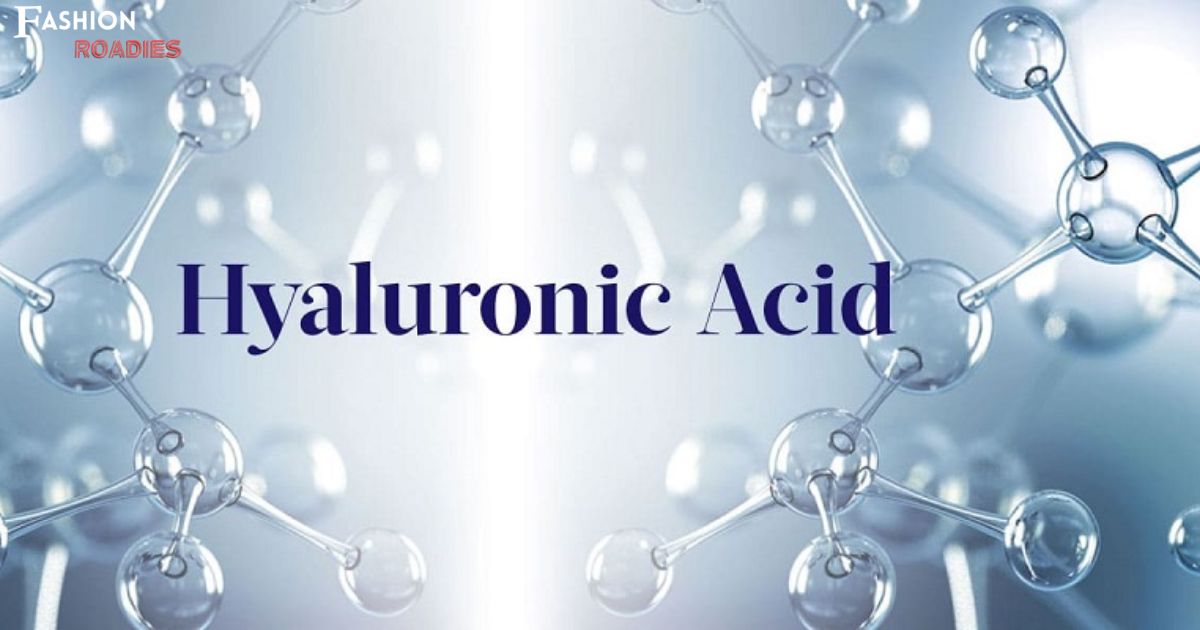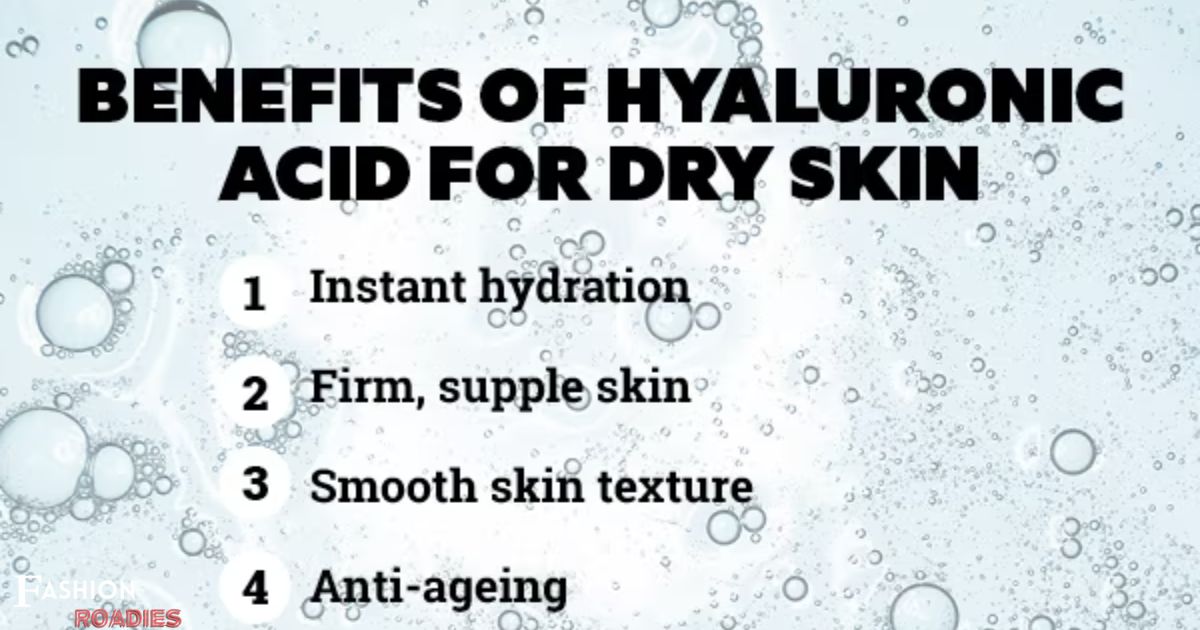Hyaluronic acid (HA) is a naturally occurring substance found in the human body, primarily in the connective tissues, eyes, and joints. It is a glycosaminoglycan, a type of molecule composed of sugar molecules (glucosamine and glucuronic acid) that are linked together in a chain-like structure.
In the context of skincare and beauty products, hyaluronic acid is often derived or synthesized for use in topical applications. It has gained popularity for its remarkable ability to attract and retain water molecules.
One of the main functions of hyaluronic acid is its incredible capacity to hold water. It can bind to water molecules and retain a significant amount of moisture, which is crucial for maintaining the hydration and plumpness of the skin. In this article you would get to know more benefits and uses of it.
Benefits Of Hyaluronic Acid
Hyaluronic acid (HA) offers several benefits, particularly in the realm of skincare. Here are some key advantages of incorporating hyaluronic acid into your skincare routine:
Intense Hydration
One of the primary benefits of hyaluronic acid is its exceptional ability to retain water. It can hold up to 1,000 times its weight in water, providing intense hydration to the skin. This helps in maintaining skin suppleness, preventing dryness, and reducing the appearance of fine lines and wrinkles associated with dehydrated skin.
Anti-Aging Properties
As we age, the production of hyaluronic acid in the skin decreases. By applying hyaluronic acid topically, it helps to replenish and maintain moisture levels, reducing the visible signs of aging. This includes minimizing the appearance of fine lines and wrinkles, promoting a smoother and plumper complexion.
Collagen Support
Hyaluronic acid plays a role in supporting collagen, a protein crucial for skin structure and firmness. By maintaining optimal hydration levels, hyaluronic acid indirectly supports the production and preservation of collagen, contributing to the skin’s elasticity and suppleness.
Enhances Skin Texture
Regular use of hyaluronic acid can contribute to improved skin texture, making the skin feel softer and smoother. Its hydrating properties also help create a more even skin tone.
Versatility for All Skin Types
Hyaluronic acid is suitable for all skin types, including sensitive and acne-prone skin. It is a lightweight and non-comedogenic ingredient that doesn’t clog pores, making it versatile for various skincare formulations.
Boosts Wound Healing
Hyaluronic acid has been shown to aid in the wound healing process. It can help reduce inflammation and support tissue repair, making it beneficial for minor skin injuries and irritations.
Soothing and Calming
HA has anti-inflammatory properties, making it effective in soothing and calming irritated or redness-prone skin. This makes it a valuable ingredient for individuals with sensitive skin.
Improves Sun-Damaged Skin
UV exposure can lead to skin damage and premature aging. Hyaluronic acid helps in replenishing lost moisture and supporting the skin’s natural barrier function, which can be compromised by sun exposure.
Can Be Used with Other Ingredients
Hyaluronic acid is often included in skincare formulations alongside other active ingredients, such as antioxidants, peptides, and vitamins. This combination can enhance the overall effectiveness of a skincare routine.
Non-Greasy and Lightweight
Hyaluronic acid has a lightweight and non-greasy texture, making it comfortable for everyday use. It absorbs quickly into the skin, leaving it feeling refreshed and hydrated without a heavy or sticky residue.
Uses Of Hyaluronic Acid For Skin
Hyaluronic acid (HA) is a versatile ingredient that can be used in various forms and products to address different skincare concerns. Here are common ways in which hyaluronic acid is used:
- Hyaluronic acid is a popular ingredient in moisturizers due to its exceptional hydrating properties. It helps to attract and retain water, keeping the skin moisturized and preventing dehydration. HA-infused moisturizers are suitable for all skin types.
- Hyaluronic acid serums are concentrated formulations designed to deliver a high dose of hydration to the skin. Serums are often lightweight and can be layered with other skincare products. They are particularly beneficial for individuals seeking intense hydration and anti-aging benefits.
- Sheet masks soaked in hyaluronic acid are a popular skincare trend. These masks are applied directly to the face and left on for a specified period, allowing the skin to absorb the hydrating benefits of hyaluronic acid. Sheet masks are convenient for a quick boost of hydration.
- The delicate skin around the eyes can benefit from the moisturizing and plumping effects of hyaluronic acid. Eye creams containing HA help reduce the appearance of fine lines, puffiness, and dark circles.
- Hyaluronic acid is commonly used in cosmetic procedures as a dermal filler to add volume and reduce the appearance of wrinkles and fine lines. These injectable fillers are administered by qualified medical professionals to enhance facial contours and provide a more youthful appearance.
- Given its hydrating properties, hyaluronic acid is often included in lip balms and lip products. It helps keep the lips moisturized, smooth, and plump.
- Some makeup primers contain hyaluronic acid to create a smooth and hydrated base for makeup application. This can help improve the overall look and longevity of makeup.
- Hyaluronic acid is sometimes added to sunscreens to provide additional hydration and maintain skin moisture. Sunscreens with HA can be beneficial for individuals with dry or sensitive skin.
- While less common, some cleansers may contain hyaluronic acid to provide a gentle and hydrating cleansing experience. These cleansers aim to cleanse the skin without stripping away its natural moisture.
- Some people incorporate hyaluronic acid into DIY masks by mixing it with other skincare ingredients. However, it’s crucial to ensure proper hygiene and use the right concentrations to avoid potential irritation.
Does hyaluronic acid brighten skin?
Hyaluronic acid can help you reduce pigmentation and blemishes associated with age when used in combination with brighteners. A common cause of hyperpigmentation is when damage to the skin caused by excessive sun exposure occurs.
Vitamin C is one antioxidant that combats dark spots caused by sun exposure. However, it can be used in conjunction with other ingredients that do have skin lightening properties, such as vitamin C or kojic acid.
Side Effects of Hyaluronic Acid
While hyaluronic acid is generally well-tolerated by most individuals, some may experience mild and temporary side effects. Common side effects include redness, itching, or irritation at the application site. In rare cases, individuals with sensitive skin may develop an allergic reaction, leading to more severe symptoms such as swelling or hives.
It’s essential to perform a patch test before incorporating hyaluronic acid products into your skincare routine to assess individual sensitivity. Additionally, consulting with a dermatologist is advisable, especially for those with pre-existing skin conditions or a history of allergies, to ensure the safe and effective use of hyaluronic acid in skincare.
Conclusion
In conclusion, hyaluronic acid stands out as a versatile and beneficial ingredient in skincare, offering unparalleled hydration and anti-aging benefits. Its ability to attract and retain moisture makes it a go-to for individuals seeking to address dryness, fine lines, and overall skin rejuvenation.
While generally safe, it’s crucial to be mindful of potential side effects and conduct patch tests, particularly for those with sensitive skin. Whether incorporated into daily moisturizers, serums, or as part of specialized treatments, hyaluronic acid has earned its place as a skincare staple, contributing to a more hydrated, plump, and youthful complexion.
As with any skincare regimen, individual preferences and skin types may vary, so consulting with a dermatologist ensures a tailored approach for optimal results.
Frequently Asked Questions
Is hyaluronic acid good for dry skin?
Hyaluronic is very beneficial for dry skin as it tends to hold moisture in your skin and provide your skin instant relief from dryness. Using it appropriately in your skincare routine does wonders for your skin.
Hyaluronic acid benefits for acne?
While hyaluronic acid is not a direct treatment for acne, it can reduce inflammation, soothe irritated skin, hydrate your skin, and promote healing. If you have acne-prone skin, it’s important to choose high-quality hyaluronic acid products that are suitable for your skin type.
How to use Hyaluronic Acid Serum?
Apply 2-3 drops on a clean face, patting the serum on the face to get it absorbed, followed by Pure Aloe Vera Gel with Rose & Hyaluronic Acid.
How can we use vitamin c serum and hyaluronic acid together?
These are both powerful skincare ingredients that work well together. For more benefits from these combinations, you must try our vitamin C serum by following written directions.
Can we use hyaluronic acid daily?
Yes, you can use hyaluronic acid daily as part of your minimalist skincare routine, as it is a gentle and safe ingredient that is suitable for all skin types and also provides a wide range of benefits to the skin.









